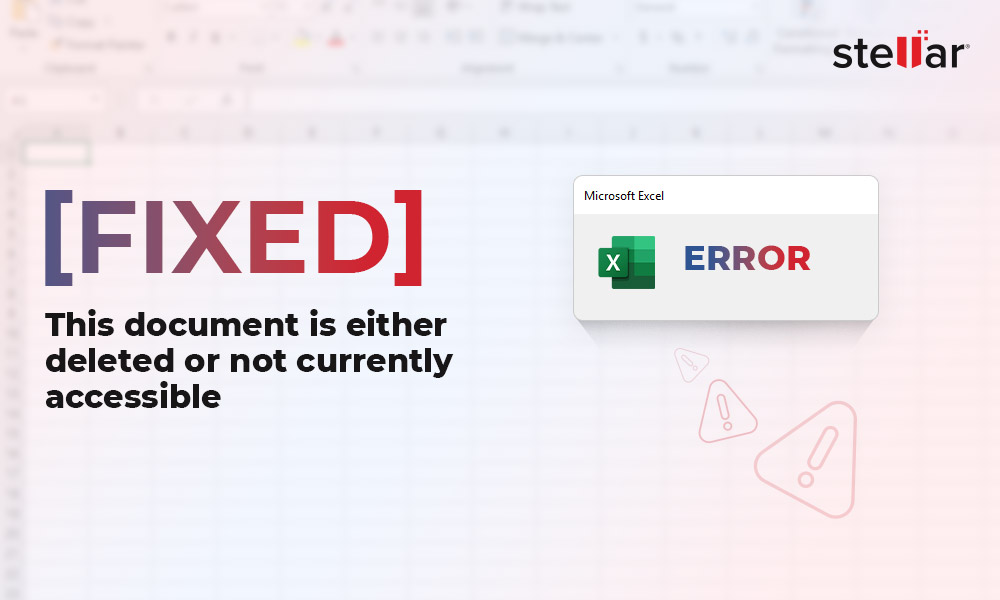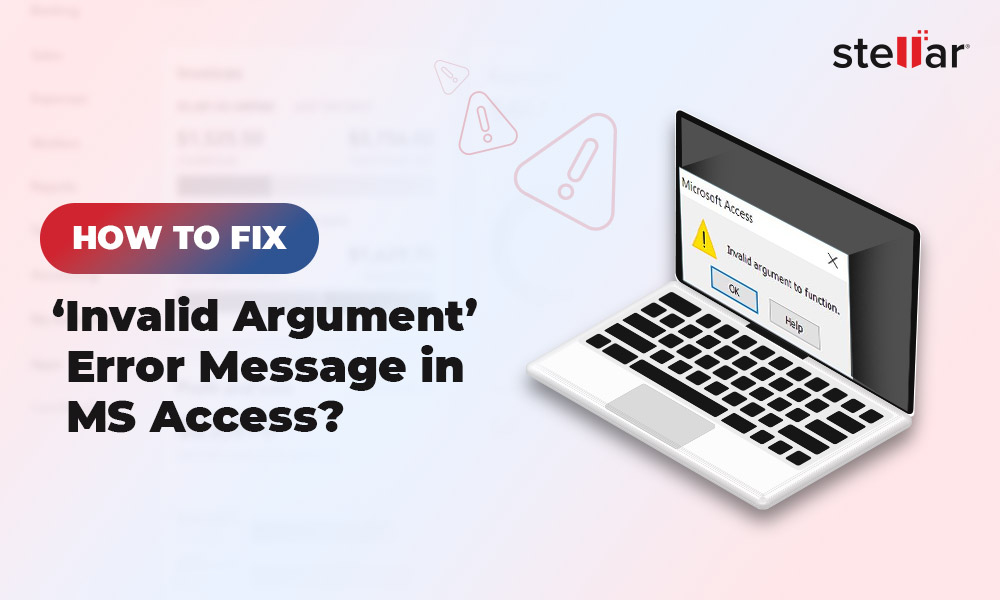Error Messages Indicating Corruption in Excel File
- When an Excel 2016 file turns corrupt, you’ll receive an error message that reads: “The file is corrupt and cannot be opened.”
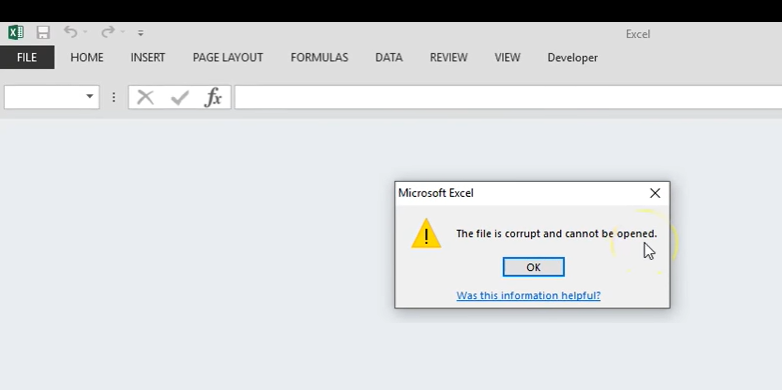
- But sometimes, you encounter the “Excel cannot open this file” error message due to corruption in the file.
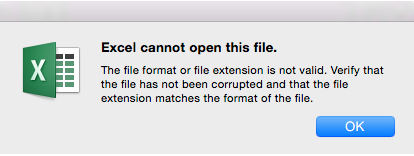
Why does Excel File turn Corrupt?
Following are some common reasons that can turn an Excel file corrupt:
- Large size of the Excel file
- The file is virus infected
- Hard drive on which Excel file is stored has developed bad sectors
- Abrupt system shutdown while working on a worksheet
Workarounds to Recover Data from Corrupt Excel
The workarounds to recover corrupted Excel file 2016 data will vary depending on whether you can open the file or not.
How to Recover Corrupted Excel File 2016 Data When You Can Open the File?If the corrupt Excel file is open, try any of the following workarounds to retrieve the data:
Workaround 1 – Use the Recover Unsaved Workbooks Option
If your Excel file gets corrupt while you are working on it and you haven’t saved the changes, you can try retrieving the file’s data by following these steps:
- Open your Excel 2016 application and click on the Open Other Workbooks option.

- Click the Recover Unsaved Workbooks button at the bottom of the ‘Recent Workbooks’ section.
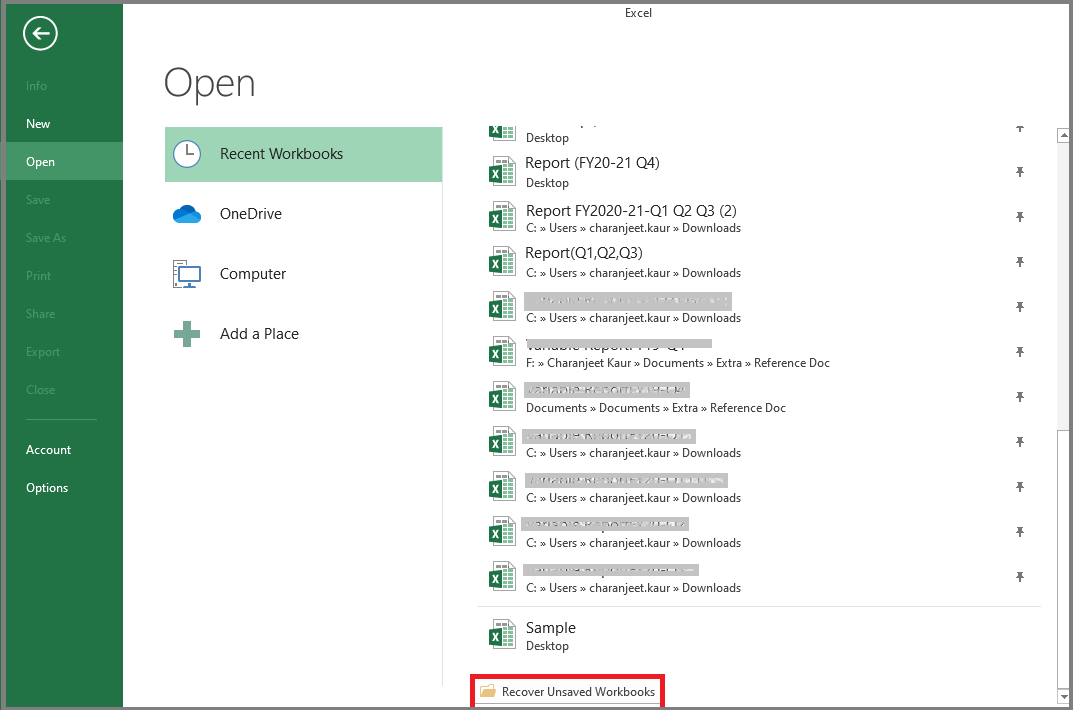
- A window with list of unsaved Excel files will open. Click the corrupt file you want to open.
This will reopen your last saved version of the Excel workbook. If this method doesn’t work, proceed with the next workaround.
Workaround 2 – Revert to Last Saved Version of your Excel File
If your Excel file gets corrupt in the middle of making any changes, you can recover the file’s data if the changes haven’t been saved. For this, you need to revert to the last saved version of your Excel file. Doing so will discard any changes that may have caused the file to turn corrupt. Here’s how to do it:
- In your Excel 2016 file, click File from the main menu.
- Click Open. From the list of workbooks under Recent workbooks, double-click the corrupt workbook that is already open in Excel.
- Click Yes when prompted to reopen the workbook.
Excel will revert the corrupt file to its last saved version. If it fails, skip to the next workaround.
Workaround 3 – Save the Corrupted Excel File in Symbolic Link (SYLK) Format
Saving an Excel file in SYLK format might help you filter out corrupted elements from the file. Here are the steps to do so:
- From your Excel File menu, choose Save As.
- In ‘Save As’ window that pops-up, from the Save as type dropdown list, choose the SYLK (Symbolic Link) option, and then click Save.
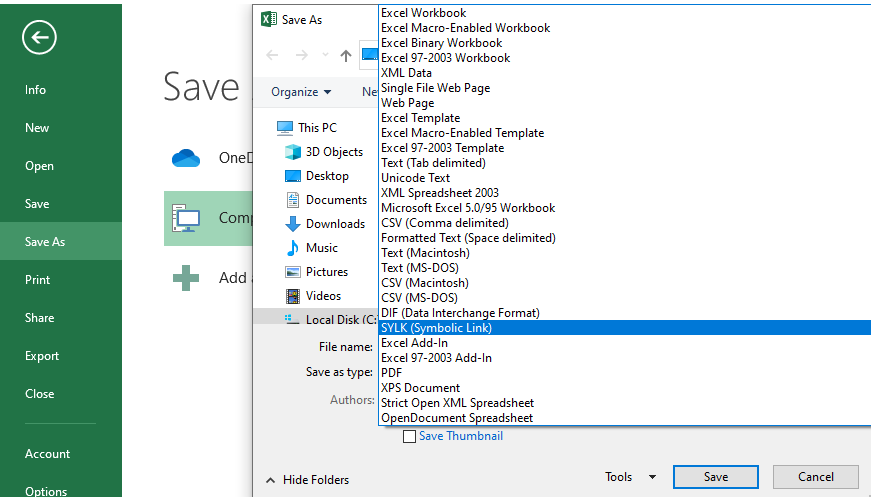
Note: Only the active sheet will be saved in workbook on choosing the SYLK format.
- Click OK when prompted that “The selected file type does not support workbooks that contain multiple sheets”. This will only save the active sheet.

- Click Yes when the warning message appears - “Some features in your workbook might be lost if you save it as SYLK (Symbolic Link)”.

- Click File > Open.
- Browse the corrupt workbook saved with SYLK format (.slk) and open it.
- After opening the file, select File > Save As.
- In ‘Save as type’ dialog box, select Excel workbook.
- Rename the workbook and hit the Save button.
After performing these steps, a copy of your original workbook will be saved at the specified location.
How to Recover Corrupted Excel File 2016 Data When You Cannot Open the File?If you can’t access the Excel file, apply one of these workarounds to salvage the file’s data.
Workaround 1 – Open and Repair the Excel File
Excel automatically initiates ‘File Recovery’ mode on opening a corrupt file. After starting the auto-recovery mode, it attempts to reopen and repair the corrupt Excel file at the same time. If the auto-recovery mode does not start automatically, you can try to fix corrupted Excel file 2016 manually by using ‘Open and Repair’. Follow these steps:
- Open a blank file, click the File tab and select Open.
- Browse the location where the corrupt 2016 Excel file is stored.
- When an ‘Open’ dialog box appears, select the file you want to repair.
- Once the file is selected, click the arrow next to the Open button, and then click the Open and Repair button.
- Do any of these actions:
- Click Repair to fix corrupted file and recover data from it.
- Click Extract Data if you cannot repair the file or only need to extract values and formulas.

If performing these actions doesn’t help you retrieve the data, proceed with the next workaround.
Workaround 2 – Disable the Protected View Settings
Follow these steps to disable the protected view settings in an Excel file:
- Open a blank 2016 workbook.
- Click the File tab and then select Options.
- When an Excel Options window opens, click Trust Center > Trust Center Settings.
- In the window that pops-up, choose Protected View from the left side navigation. Under ‘Protected View’, uncheck all the checkboxes, and then hit OK.
- From your Excel file, click File > Open.
- From the window that opens, click Computer and then click Browse and copy the name of your corrupt Excel 2016 file. Click the Cancel button.
- Go back to your Excel file, click File > New > Blank workbook.
- In the new Excel workbook, type “=CorruptExcelFile Name!A1” in cell A1 to reference cell A1 of the corrupted file. Replace the ‘CorruptExcelFile Name’ with the name of the corrupt file that you have copied above. Hit ENTER.
- If ‘Update Values’ dialog box appears, select the corrupt 2016 Excel file, and then click OK.
- If ‘Select Sheet’ dialog box pops-up, select a corrupt sheet, and press the OK button.
- Select and drag cell A1 till the columns required to store the data of your corrupted Excel file.
- Next, copy row A and drag it down to the rows needed to save the file’s data.
- Select and copy the file’s data.
- From the Edit menu, choose the Paste Special option and then select Values. Click OK to paste values and remove the reference links to the corrupt file.
- Recovers tables, pivot tables, images, charts, chartsheets, hidden sheets, etc.
- Maintains original spreadsheet properties and cell formatting
- Batch repair multiple Excel XLS/XLSX files in a single go
- Supports MS Excel 2019, 2016, 2013, and previous versions

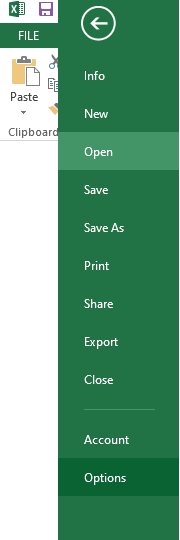
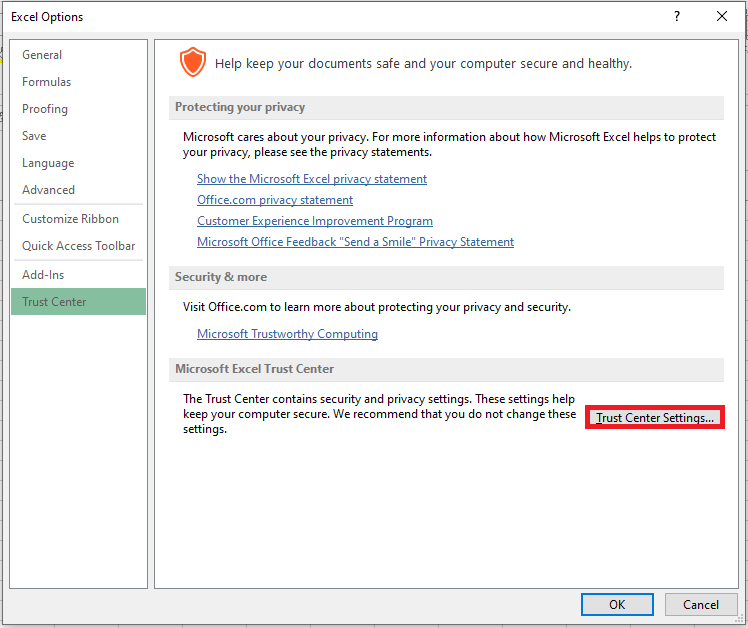
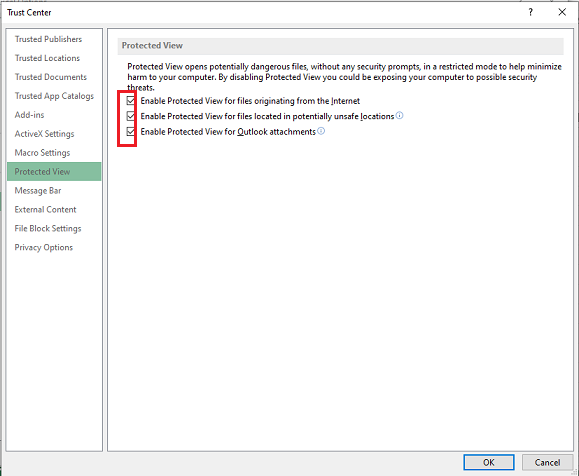
Now, try opening your corrupt Excel 2016 file. If it won’t open, try the next workaround.
Workaround 3 – Link to the Corrupt Excel File using External References
If you only need to extract Excel file data without formulas or calculated values, use external references to link to your corrupt Excel 2016 file. Here’s how you can do it:
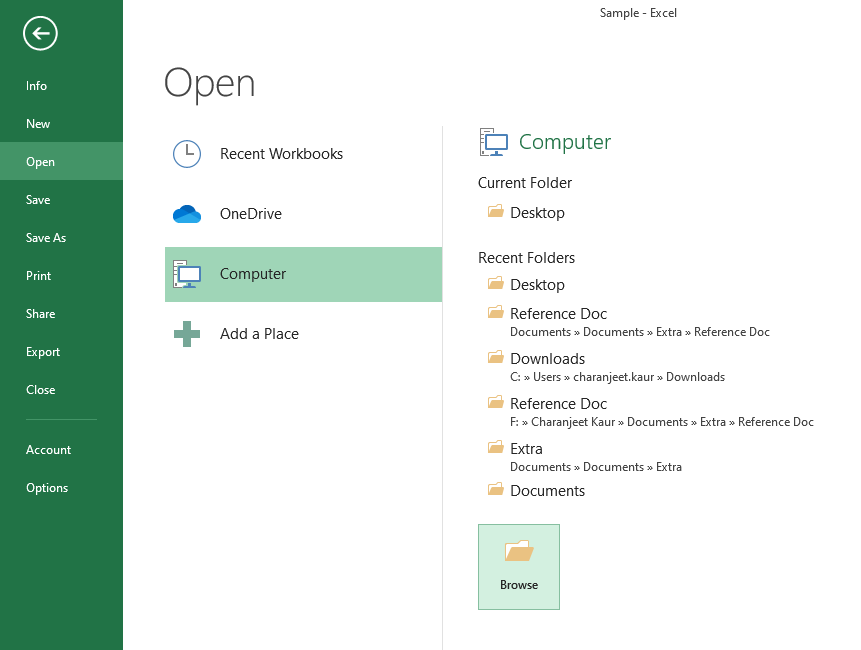
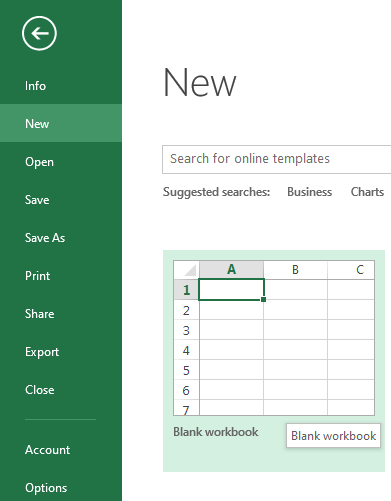
Check the new Excel file for recoverable data. If this didn’t work, consider using an Excel file repair tool to retrieve data.
Alternative Solution to Recover Excel File Data
Applying the above workarounds may take considerable time to recover corrupted Excel file 2016. Also, they may fail to extract data from a severely corrupted file. Using Stellar Repair for Excel software can help you overcome these limitations. The software helps repair severely corrupted XLS/XLSX file and retrieve all the file data in a few simple steps.
Key benefits of using Stellar Repair for Excel are as follows:
Check out this video to know how the Excel file repair tool from Stellar® works:
Conclusion
Errors such as ‘the file is corrupt and cannot be opened’, ‘Excel cannot open this file’, etc. indicate corruption in an Excel file. Large-sized workbook, virus infection, bad sectors on hard disk drive, etc. are some reasons that may result in Excel file corruption. The workarounds discussed in this article can help you recover corrupted Excel file 2016 data. However, manual methods can be time-consuming and might fail to extract data from severely corrupted workbook. A better alternative is to use Stellar Repair for Excel software that is purpose-built to repair and recover data from damaged or corrupted Excel file.















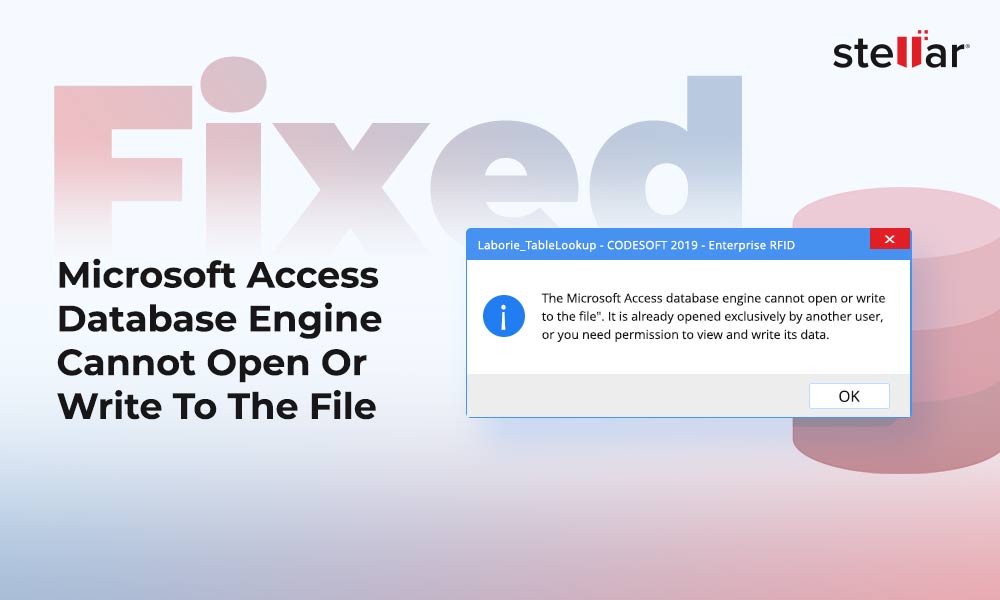
 7 min read
7 min read